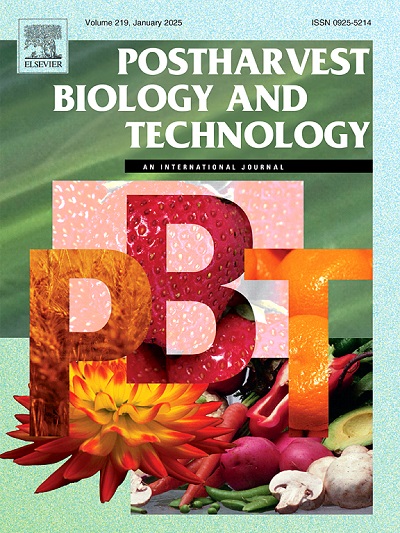MeJA and MeSA alleviate black rot in winter jujube caused by Alternaria tenuissima by regulating membrane lipid and reactive oxygen metabolism
IF 6.4
1区 农林科学
Q1 AGRONOMY
引用次数: 0
Abstract
Black rot is a serious disease caused by Alternaria tenuissima (A. tenuissima) that affects winter jujubes. This study explored the effects of MeJA and MeSA on disease resistance in winter jujubes by regulating membrane lipid and reactive oxygen metabolism in response to A. tenuissima infection. MeJA and MeSA significantly reduced the disease severity in winter jujube, enhanced the activity and gene expression of antioxidant-related enzymes, inhibited the activity and gene expression of membrane lipid oxidation-related enzymes, delayed the decomposition of ascorbic acid, glutathione, phosphatidylcholine, and phosphatidylinositol, inhibited the accumulation of hydrogen peroxide, phosphatidic acid, and malondialdehyde, the production rate of superoxide anion and a rise in relative electrical conductivity, and maintained winter jujube cell membrane unsaturation (U/S). Compared with the sterile water treatment, the regulation of membrane lipid metabolism and ROS metabolism in winter jujube fruits by MeJA and MeSA could be a contributing factor to their enhanced resistance against A. tenuissima. The membrane lipid oxidation degree in the MeJA group was lower, indicating that MeJA had better application prospects in disease resistance and storing and preserving winter jujube than MeSA.
MeJA和MeSA通过调节膜脂和活性氧代谢缓解由Alternaria tenuissima引起的冬枣黑腐病
黑腐病是由Alternaria tenuissima(A. tenuissima)引起的一种严重病害,主要危害冬枣。本研究探讨了 MeJA 和 MeSA 通过调节膜脂和活性氧代谢对冬枣抗病性的影响。MeJA 和 MeSA 能明显减轻冬枣的病害程度,提高抗氧化相关酶的活性和基因表达,抑制膜脂氧化相关酶的活性和基因表达,延缓抗坏血酸、谷胱甘肽和磷脂酰胆碱的分解、磷脂酰胆碱和磷脂酰肌醇的分解,抑制过氧化氢、磷脂酸和丙二醛的积累,抑制超氧阴离子的产生率和相对电导率的升高,维持冬枣细胞膜的不饱和度(U/S)。与无菌水处理相比,MeJA和MeSA对冬枣果实膜脂代谢和ROS代谢的调节作用可能是冬枣对A. tenuissima抗性增强的一个因素。MeJA 组的膜脂氧化程度较低,表明 MeJA 在冬枣抗病和贮藏保鲜方面比 MeSA 有更好的应用前景。
本文章由计算机程序翻译,如有差异,请以英文原文为准。
求助全文
约1分钟内获得全文
求助全文
来源期刊

Postharvest Biology and Technology
农林科学-农艺学
CiteScore
12.00
自引率
11.40%
发文量
309
审稿时长
38 days
期刊介绍:
The journal is devoted exclusively to the publication of original papers, review articles and frontiers articles on biological and technological postharvest research. This includes the areas of postharvest storage, treatments and underpinning mechanisms, quality evaluation, packaging, handling and distribution of fresh horticultural crops including fruit, vegetables, flowers and nuts, but excluding grains, seeds and forages.
Papers reporting novel insights from fundamental and interdisciplinary research will be particularly encouraged. These disciplines include systems biology, bioinformatics, entomology, plant physiology, plant pathology, (bio)chemistry, engineering, modelling, and technologies for nondestructive testing.
Manuscripts on fresh food crops that will be further processed after postharvest storage, or on food processes beyond refrigeration, packaging and minimal processing will not be considered.
 求助内容:
求助内容: 应助结果提醒方式:
应助结果提醒方式:


